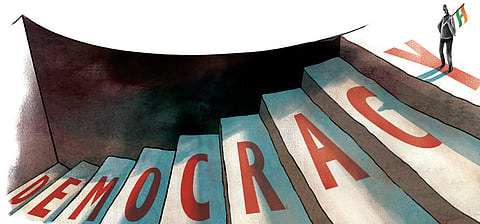

While laying the foundation stone for the new Parliament building in the national capital last week, Prime Minister Narendra Modi spoke of India’s tryst with democracy long before the Magna Carta was signed in England in 1215 offering liberty and freedom to the people. He referred to Anubhava Mantapa—a peoples’ Parliament open to all sections of society—established by the philosopher-saint Basaveshwara in Karnataka a century earlier.
The egalitarian principles laid down by the saint were later incorporated in the composition of democratic assemblies in many countries. Modi also referred to the prevailing electoral rules during the Chola period in the 10th century, as seen in inscriptions found in Uthiramerur, a village in Kanchipuram district, Tamil Nadu. The inscription said every kudumbam (community) would be represented in the peoples’ assembly. It also listed out the rules for eligibility of candidates and said persons who do not declare their assets would be barred from contesting elections. He also referred to the sanghas and sabhas that existed in different parts of ancient India.
These were extremely progressive democratic traditions. Further, Indians have a great comfort level with democracy, as evidenced by the steady increase in the voter turnout, whereas people are/were losing interest in democracy in many other nations. Finally, of course, India is the largest and most vibrant democracy in the world. It is, therefore, the “Mother of Democracy”. In the light of all this evidence, he wondered why India’s democracy should be viewed through Western eyes.
This brings us to the question as to why the citizens of the largest democracy allow small nations across the Western world, which are often incomplete democracies, to define the concept and lecture India on these values. A case in point is the annual exercise undertaken by some NGOs and academic institutions in the West to weigh nations on the democracy scale. For example, a recent report on democracy, produced by a Swedish Institute called Varieties of Democracy (V-Dem), has downgraded India and put it far below several nations, many of whom lack the essentials of democracy like secularism, separation of state and religion, and equality before law, which are firmly embedded in India’s Constitution.
The report places India at a lowly 90, while the best democracies are supposedly Denmark, Estonia, Sweden, Switzerland, Norway, etc. This needs to be challenged.Having examined the constitutions of dozens of nations, this writer is of the view that a pristine democracy must contain the following eight fundamentals: An inviolable commitment to freedom of expression and of conscience; an unambiguous commitment to secularism; separation of religion and state; republican form of government; constitutional right to equality before law; gender equality; right to life and personal liberty; and universal adult suffrage. All these eight essentials exist in the Indian Constitution.
Now let us look at the V-Dem report and the countries ahead of India. Denmark is the best democracy according to this report. But is it? Its Constitution says that the Evangelical Lutheran Church, which is based on the Holy Bible, “shall be the established church of Denmark”. Further, “the State has a duty to support the Church of Denmark financially and in other ways”. Sweden is number 3, but it is not a republic. Its constitution says the head of state “shall be a king or queen”.
More importantly, the Constitution says the king or queen cannot be prosecuted for his or her actions, which means equality before law (Article 14 in our Constitution) has no place in Sweden. Further, the constitution says the king “shall always profess the pure evangelical faith”. It also does not allow the prince or princess to marry at will. They need government permission to do so! Therefore, Sweden is not a republic, it is not a secular nation, its head of state is wedded to a church and members of the royal family do not have freedom of conscience. Equality before law is also absent because the king cannot be censured or accused. Yet, V-Dem wants us to accept Sweden as a model democracy. India will never accept it.
Other nations that have been put ahead of India include Papua New Guinea, a nation based on Christian principles; and Argentina, where the federal government supports the Roman Catholic Apostolic Religion. India is not only a secular, democratic nation but also the most vibrant and diverse country in the world. It has the secular ideal embedded in the Preamble of its Constitution. It is home to all the religions, its population is ethnically diverse, and its people speak 122 languages and 170 dialects.
Therefore, those who seek to run down India are actually running down democracy itself. These Western notions of “democracy”, where the authors propound theories convenient to them, need to be challenged. India needs to stand up now and say: “Don’t lecture us—your theories have a strong stench of racism and communalism.”
Finally, coming back to what the prime minister said last week, we need to shake off the reticence of the Nehru era and take charge of the discourse on democracy. Henceforth, the Indian story will have to revolve around this central theme and the Ministry of External Affairs will have to make this India’s USP, beginning by ticking off non-secular, non-republican nations and countries that do not have the equivalent of Article 14 (equality before laws) and Article 27 (state shall not fund any particular religion) when they comment on India. Only then will Modi’s vision to see India being recognised as the ‘Mother of Democracy’ be realised.
A SURYA PRAKASH
Vice-Chairman, Executive Council, Nehru Memorial Museum & Library
(suryamedia@gmail.com)